homepage news
NCLR’s Kate Kendell steps down and into LGBT history
It’s time for a younger leader, she says
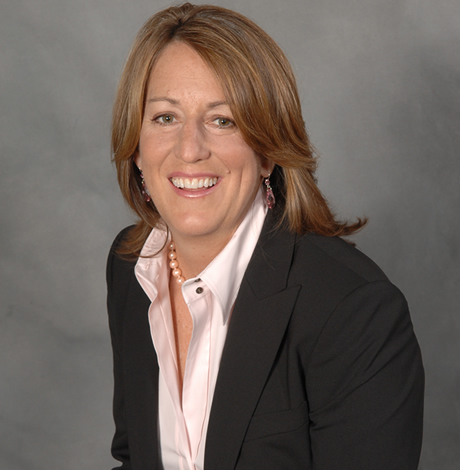
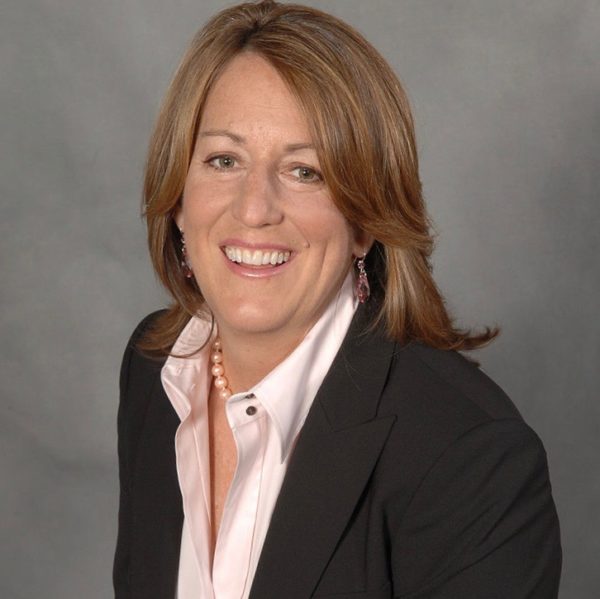
NCLR Executive Director Kate Kendell (courtesy NCLR)
LGBT politicos nationwide were struck by the March 15 announcement that National Center for Lesbian Rights executive director Kate Kendell was stepping down after more than 22 years of service advancing social and economic justice through the lens of LGBT civil rights.
“Kate literally changed the world. Her leadership in advancing the rights of LGBT people from being criminals to being able to marry has transformed the lives of millions of people. She always pushed the envelope and was a constant voice for our movement to embrace our communities’ diversity, partner with others and embrace a progressive agenda,” says Geoff Kors, Palm Springs City Councilmember, former Equality California Executive Director, and Kendell’s “brother from another mother.” “She has an ability to connect with people on our shared humanity and move them to do the right thing even when it is politically challenging.”
“We are so grateful for Kate’s decades of leadership in the fight for full LGBTQ equality and social justice,” says Equality California Executive Director Rick Zbur, noting that NCLR is currently co-representing Equality California in Stockman v. Trump, a lawsuit challenging the Trump administration’s transgender military ban. “They broke the mold when they made Kate Kendell. And while her leadership at NCLR will be missed, her legacy will live on in the work of generations of LGBTQ civil rights advocates who will stand on her shoulders.”
It is that passionate commitment to justice and human dignity that helped Kendell grow the small San Francisco-based national non-profit into a powerhouse legal advocacy legal organization.
“Kate Kendell’s charisma, passion and vision have resulted in NCLR becoming one of the most creative and effective advocacy organizations in this country. Every LGBTQ person has benefitted because of her incredible leadership,” said Donna Hitchens, the retired San Francisco Superior Court judge who founded NCLR in 1977.
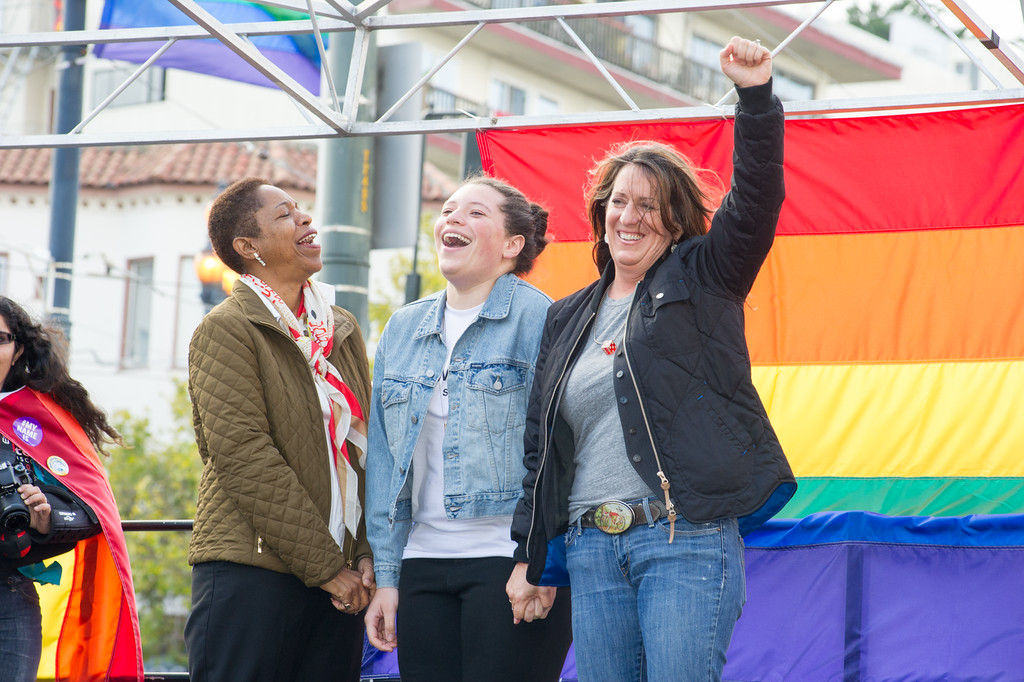
Kate Kendell, wife Sandy before Rainbow Flag (Courtesy NCLR)
“Kate Kendall is one of the most fearless and tireless advocates the LGBTQ equality movement has ever known,” says Human Rights Campaign President Chad Griffin. “Kate’s profound work is woven into the fabric of our movement and millions of Americans have felt the impact of her unwavering leadership. I am proud to call Kate a friend, colleague, and a true champion for equality.”
Even journalists pay Kendell respect. “Authentic, empathetic, fully present, flawless mix of PC and un-PC, openminded, Mormon good-girl ethics, rebellious lesbian side, a hard worker not a brander, and a fully spin-free zone. It don’t get much better,” tweeted San Diego-based semi-retired reporter Rex Wockner.
Kendell started thinking about her career trajectory a few years ago. “I’ve engaged in a fair amount of self-interrogation and reflection about when might be the right time” to leave, Kendell says in an extensive March 15 phone interview.
“It just really felt like this was the right time for me—I hit 58 next month—to pursue whatever my next chapter is,” Kendell adds. “And it’s the right time for NCLR to have a new, obviously younger leader.”
The NCLR board and management team is working on a succession plan. The search for the new executive director will officially launch on April 1.
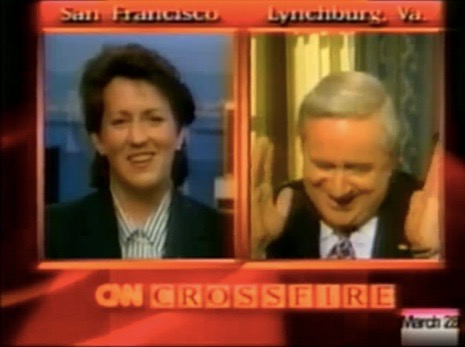
Kate Kendell debating Rev. Jerry Falwell on CNN’s “Crossfire” (Courtesy NCLR)
“I had no idea when I took the job as legal director in 1994 or even as executive director in 1996 that I would be in the role this long, that I would be a part of some of the most powerful resonant and culture-changing moments in the LGBTQ movement, or that I would be able to look back on a 22-year run with such a profound sense of gratitude and humility,” she says.
“I was lucky enough to meet Kate back in 1994, when she started as NCLR’s Legal Director after working at the Utah ACLU and we clicked right away,” Mary L. Bonauto, longtime attorney with GLAD (GLBTQ Legal Advocates & Defenders), tells the LA Blade. “For one, there were few women working in the legal organizations at that time, and we were both eager to use our legal skills to stick up for our community—for liberty, freedom and equality, even as others tried to stuff us back into the closet. And we were able to collaborate across the miles on cases and policy issues sometimes, too, including parenting cases.” NCLR’s “docket of protecting all families and children…is foundational to many of our other successes.”
Parenting issues were NCLR’s first priority as lesbian parents in heterosexual marriages came out and lost custody of their children. For generations, invisibility “protected us from the worst of this nation’s bigotry and assaultive approach to LGBTQ people. But it also rendered us unable to be our own advocates because we couldn’t be open and fight for what we wanted,” Kendell says.
”And then AIDS—which galvanized our community like nothing else could have,” Kendell continues. “And while it was never worth the death count, it still put in stark relief that being hidden, being silent, being invisible was a matter of life and death. Our visibility, our coming out, our being adamant about our own humanity and demanding that this nation recognize and honor that humanity is how we got to where we are now—in very short order by civil rights-time measurement.”
But while “the rapidity with which we’ve seen landmark change is breath-taking,” Kendell says, family issues such as adoption and child custody issues are “still a huge problem in many states.”
Some of the most heart-wrenching cases in the 1990s involved lesbian couples separating with the biological parent treating the non-biological parent as a “legal stranger” with no right to even see the child.
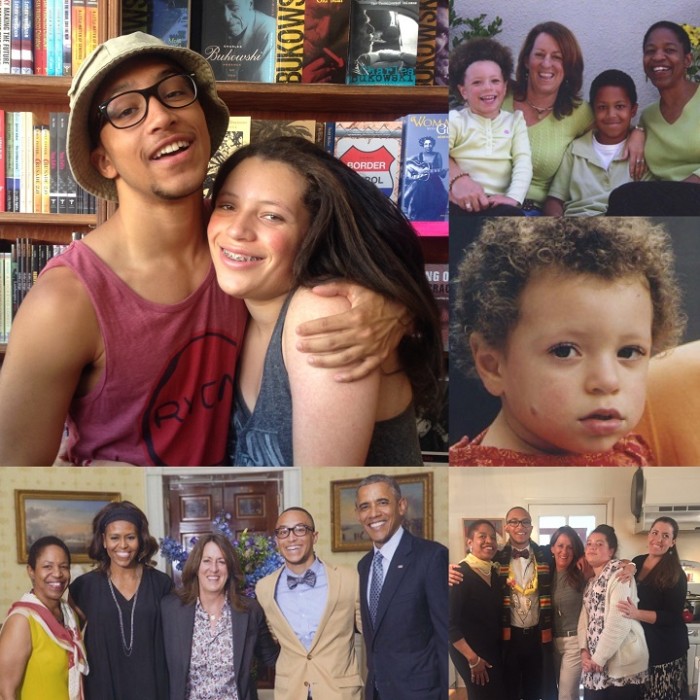
Collage of Kate Kendell and family— wife Sandy, son Julian, 20 and daughter Ariana 14. (Courtesy NCLR)
“To this day, I find it abhorrent in the extreme that there are lesbians who would use heterosexist homophobic legal arguments against not just their former partner but our entire community. It still haunts me the cases that we lost with children four, five, six-year olds being denied any ongoing relationship with their parent! Forget how traumatic and hard this is for the lesbian co-parent—as a parent myself, my kids were about the same age when we were in the thick of these cases—imagine the trauma to this child!” Kendell says. “The venality and the self-loathing and the selfishness embedded in such an action still makes my blood boil.”
Lorri L. Jean, CEO of the LA LGBT Center, says she is sad Kendell is stepping down. “Personally, she has been a valued colleague and friend and I’m going to sorely miss her indomitable presence, her support, her insight and her sense of humor,” says Jean, who also took a stand against the “legal stranger” arguments. “She has done her work with a rare and admirable combination of selflessness, courage and integrity. LGBTQ people everywhere have better lives thanks to her leadership.”
NCLR made history arguing for Sharon Smith’s right to file a wrongful death civil lawsuit after the 2001 murder of her beloved domestic partner of seven years, Diane Alexis Whipple.
Whipple, a lacrosse coach, was coming home with groceries when she was viciously attacked by two large dogs and mauled to death in her apartment hallway. Neighbors Marjorie Knoller and her husband, Robert Noel were eventually convicted of second-degree murder and manslaughter, respectively.
Smith, a vice president at a brokerage firm, filed a wrongful death suit—but California only allowed surviving spouses, children and parents to file such claims. NCLR argued to San Francisco Superior Court Judge James Robertson II that the committed couple was essentially married. Robertson agreed that limiting the right to sue to straight spouses violated the Equal Protection Clause of the state constitution.
“Up until Sharon’s case, it was virtually unheard of for a same-sex partner to be permitted to sue for wrongful death. In every prior case, the surviving partner was deemed a ‘legal stranger,’ regardless of the length or depth of the relationship,” Kendell wrote on her NCLR blog in 2011. “But that measure of vindication, while enormously important, could never bridge Sharon’s terrible loss.”
Kendell and Smith remain very close friends. “Sharon’s case really made history and changed the way people viewed our relationships,” Kendell says.
In 2004, Kendell witnessed history again. The week before Valentine’s Day when Kendell got a call from Mayor Gavin Newsom’s chief of staff saying Newsom was going to begin issuing marriage licenses to same sex couples on Monday, Feb. 9.
“At the time, I thought it was not a good idea,” Kendell says, since the marriage victory in Massachusetts prompted calls for a federal constitution ban on same sex marriage, endorsed by President George W. Bush. “It’s like a little bit of a powder keg right now,” she told him before he made it clear the action would happen “no matter what.”
Kendell talked to NCLR Legal Director Shannon Minter and Bonauto, who won the Massachusetts marriage equality case. By Sunday, Kendell concluded: “You know what—game on. Let’s just do it.”
However, Monday morning it became clear that more time was needed, including for Newsom to do some homework on the movement. “He was humble enough to understand that he needed a few more days,” Kendell says.
They prepared the new proper forms then Joyce Newstadt, Newsom’s policy director, and Kendell decided the first couple to marry had to be lesbian icons Del Martin and Phyllis Lyon.
“I called Del and Phyllis’ home and Phyllis answered and I said, ‘Phyllis, I know you and Del have already done so much for the movement, but I have one more request. Would you be willing to be the first couple that would be issued a marriage license by the City and County of San Francisco because Mayor Newsom wants to begin issuing marriage licenses to same sex couples. And she said, ‘Well, just a minute. Let me ask Del.’ I heard her put the phone down and then I heard her say, her voice a little bit muffled, ‘Kate wants to know if we want to get married.’ I didn’t hear what Del said but Phyllis came back and said, ‘Del said we’ll do it,’”Kendell recalls.
The clandestine team included Kors, Newsom’s office, the City Attorney’s office—and on Thursday morning, Feb. 12, history happened.
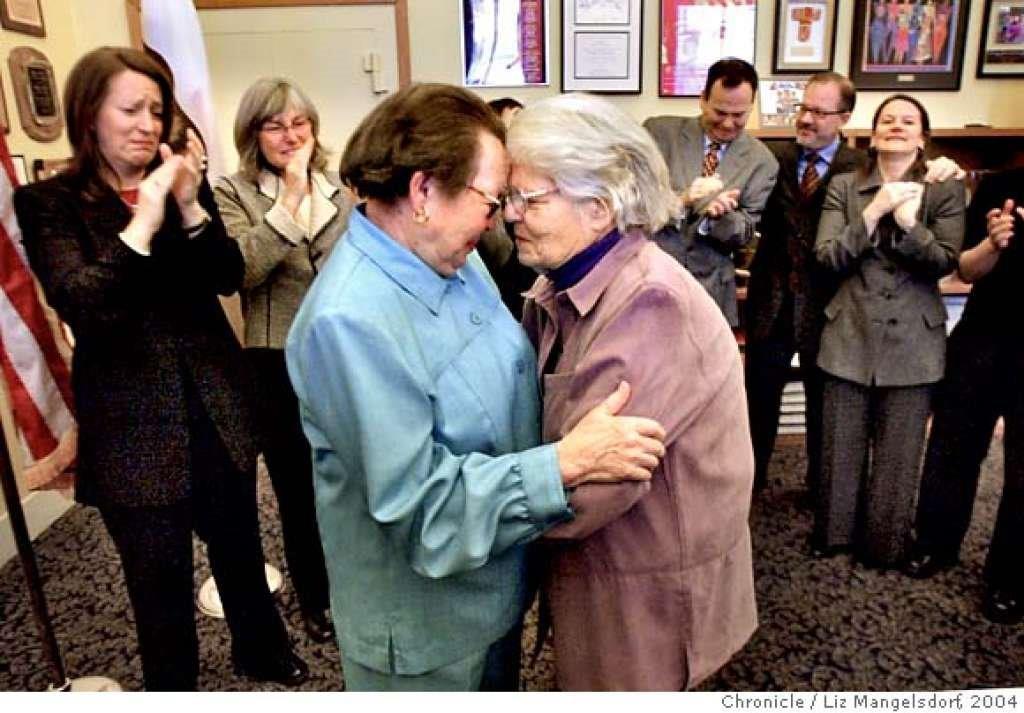
Phyllis Lyon and Del Martin marry in 2004 (Photo by Liz Mangelsdorf, courtesy NCLR)
Kendell drove the couple to City Hall in her 1972 Mercedes sedan, escorting them through the basement to avoid being seen. They waited outside Treasurer Mable Tang’s office until—“one of the greatest privileges of my life—I was there when Mable Tang did the wedding vows for Del and Phyllis and witnessed Del and Phyllis’ wedding—Feb. 12, 2004, the 51th anniversary of the day they first met.”
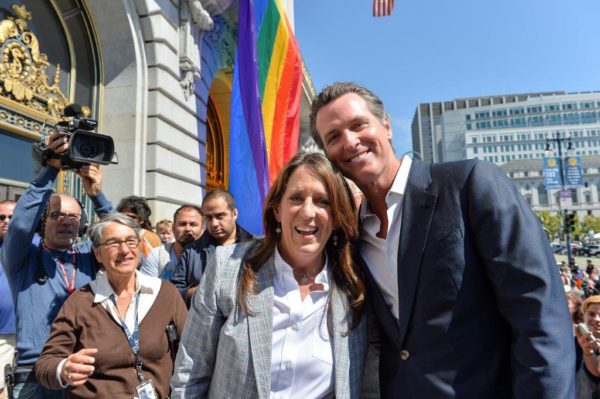
Kate Kendell and Gavin Newsom (Photo courtesy NCLR)
“In 2004—at a time when many in the Democratic Party were not ready to support marriage equality—Kate was a force whose advocacy and leadership gave us the courage to marry over 4,000 same-sex couples,” California Lt. Gov Newsom tells the LA Blade. “That’s just one in a long list of fights Kate and NCLR have taken on, and won, to benefit LGBTQ folks across the country. I am grateful for her counsel and friendship, and for her decades of bold leadership at the forefront of the movement for equality.”
“I always knew when Kate was at the table that we would be on solid ground to do the right thing,” says Newstat, now CEO of Rocket Science Associates.
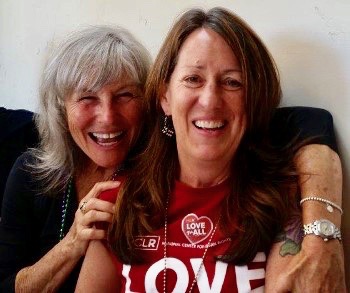
Roberta Achtenberg and Kate Kendell (Photo courtesy NCLR)
“Kate is a force of nature, and her leadership of NCLR has been nothing short of brilliant! I will remember always the day we stood shoulder to shoulder with tears in our eyes and love in our hearts as Phyllis and Del said their vows and ignited the marriage revolutions! That, and so much more, our Kate has helped make possible,” says Roberta Achtenberg, former San Francisco Supervisor and historic high-ranking official in the Clinton administration.
Kendell is proud of NCLR’s role in winning the consolidated 2004 case that resulted from that event. Minter argued, In Re Marriages before the California Supreme Court, which treated the transgender NCLR attorney with dignity and respect during oral arguments. The Court ruled marriage equality was a fundamental constitutional right in May 2008.
“Shannon was an employee of NCLR before I even got to NCLR. In fact, he and I had met a couple of years prior when I was at the ACLU and he came to Utah because we were trying to get a young lesbian girl released from a psychiatric facility where she had been institutionalized by her parents when she came out,” Kendell recalls.
“Shannon and I had been through so much together and to see him standing before the California Supreme Court as our Legal Director and my partner in so much of what had been great about NCLR and my job and to be someone I had so much respect and love and affection for was just a spectacular moment. I was proud, I was moved, I was emotional. I was inspired. It was fantastic. And he was brilliant,” Kendell gushes warmly.
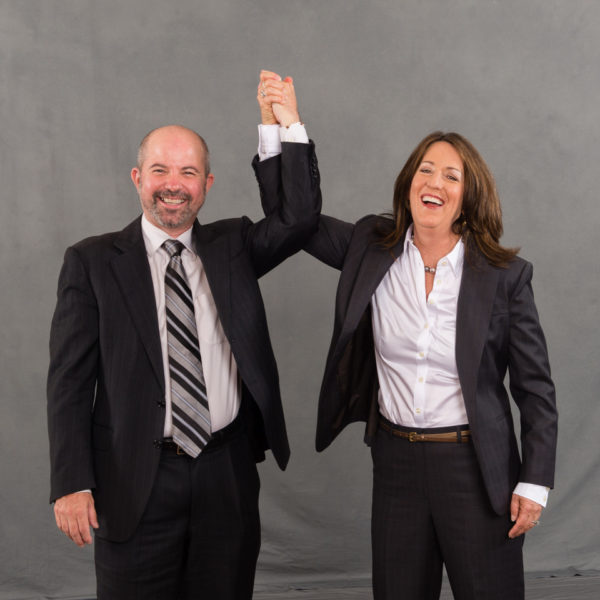
NCLR Legal Director Shannon Minter and Kate Kendell (Photo by Trish Tunney, courtesy NCLR)
Minter became the first individual to transition at an LGBT organization and the first full time transgender employee at a national LGBT organization.
Minter remembers Kendell’s reaction when he announced he was going to transitioning at work.
“I first talked to her about it in 1995, a time when transgender issues were not yet much on the radar of any national LGB group,” Minter tells the LA Blade. “Like most other LGB people at the time, Kate knew very little about transgender issues, but her response was always completely spot-on. She didn’t pretend to know more than she did, but she was enthusiastically supportive on both a personal and professional level from day one.
“When I actually transitioned in 1996, she sheltered me from any negative responses and offered unflagging acceptance and support,” Minter continues. “She set such a positive example for the whole movement in that regard. At the same time, she was always real, including telling me when I complained about having a hard time finding men’s shirts that fit that my arms, which were too short! I have loved teasing her about that over the years.”
He adds, “Kate has never flinched from a fight. She has empowered our staff to launch innovative new projects and then trusted them to take risks. As a result, she has nurtured some of the most impressive leaders in our community.”
One of the hardest issues was Proposition 8, the anti-gay marriage ballot initiative that passed in November 2008.
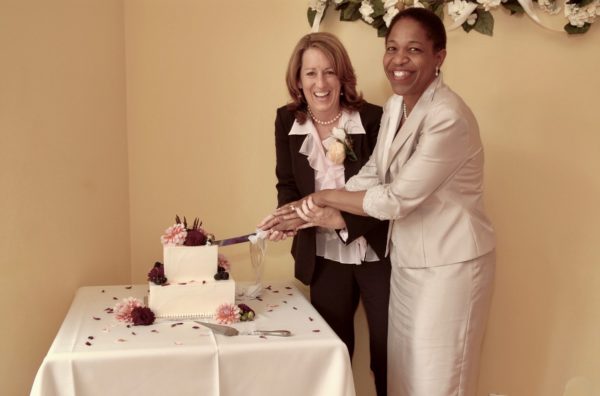
Kate and Sandy get married (Photo courtesy NCLR)
“What happened in Prop 8 was the lowest point of my career and it just followed on the heels of one of the highest points of my career,” Kendell says. “When we won marriage in California, I was ecstatic….I knew that the resonance of ending discrimination in marriage was going to be a huge lift to every other facet of the lives of queer people. And I believe that has been borne out to be true,” she says.
“I knew Prop 8 was an existential threat and I knew it had a very good chance of passage. But it was impossible to get people to focus on it because everybody was still elated that we’d won marriage and they couldn’t believe that California voters would vote to take away marriage!” Kendell says, her voice rising as if reliving the fall of 2008. “So when Prop 8 passed—I remember the entire night. I remember the growing feeling of dread and nausea. And I remember a sleepless night absolutely devastated and then having to face the next morning. It was a brutal, brutal experience” that left her seriously depressed for six months.
But there was an upside. “I believe that had it not been for Prop 8, we wouldn’t have won marriage as quickly as we did in this country. It shocked the shit out of people that we could see marriage taken away at the ballot box and it galvanized and energized a huge new generation of LGBTQ folks to engage in the fight. And that moment really changed everything, in terms of our momentum,” Kendell says.
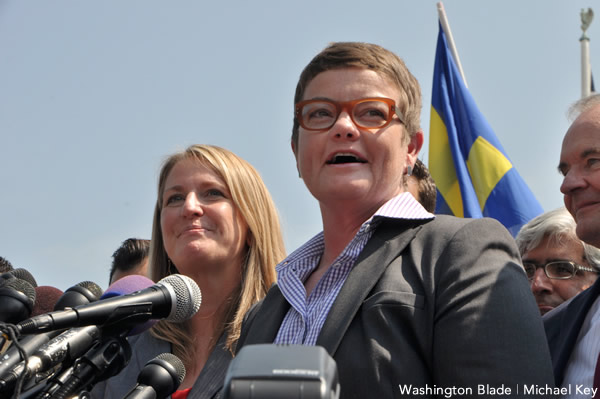
Federal Prop 8 plaintiffs Kris Perry and Sandy Stier at the Supreme Court (Washington Blade photo by Michael Key)
“We have admired her courageous leadership and ability to build support for NCLR for many years but we will be forever grateful to Kate for her unequivocal support during our challenge to Proposition 8 and subsequent friendship,” successful federal Prop 8 plaintiffs Kris Perry and Sandy Stier tell The LA Blade.
Kendell and NCLR have also worked hard on intersectional issues that “deeply impact LGBTQ people,” such as immigration, policing, criminal justice, asylum and poverty issues. “If those issues are not an essential part of every LGBTQ organization, we are doing a disservice and we are leaving people behind,” she says. “There can be no more important work for us to do than actually saving lives.”
“Kate has a clear vision of the intersections in our communities. Whether as an advocate for LGBT immigrants, same sex parents, or transgender youth, she has the best interests of all of us impacted by the range of prejudice and bigotry when she bravely steps forward time after time,” says longtime Democratic Latina politico, Gloria Nieto. “She is the definition of fierce and our communities are more fierce thanks to Kate Kendell.”
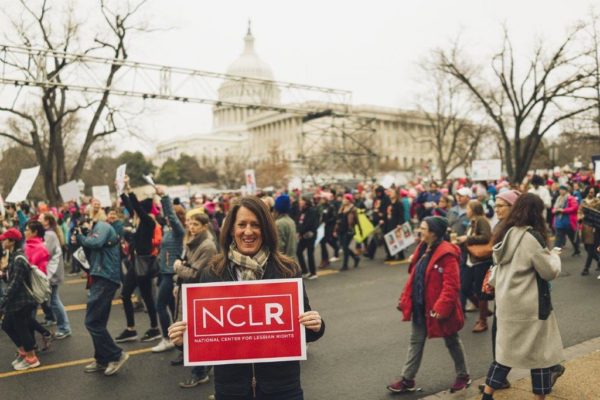
Kate Kendell at the Women’s March 2017 (Photo courtesy NCLR)
“Having worked side-by-side with Kate Kendell—including as co-counsel in a number of path-breaking cases—for three decades,” says Jon Davidson, former Legal Director of Lambda Legal, “I often have had the pleasure of seeing Kate’s inspired leadership, passion, smarts, and tenacity up close. She fought tirelessly for the full breadth of our communities, ensured that the LGBTQ rights movement incorporated essential feminist perspectives, and successfully built alliances that have been key to our success. We collectively owe her a huge debt of gratitude, as we certainly would not have made the progress we have but for her many years of hard work.”
Kendell feels that the fight for social justice and intersectionality is “baked into DNA” at NCLR. And while the Right “is still going to fight us at every turn,” her 22 years have taught her that “people are generally good and want to be good but are stopped by being scared.” So, she says, “it’s important to meet people where they are, even when that’s difficult.”
The stakes now are high. “We are in a fight about who we are as a nation,” Kate Kendell says. “But I do have hope. Like Harvey Milk said, we have to give them hope. Because if we lose hope, we concede ground to our enemy. And I do not concede!”
homepage news
Honoring the legacy of New Orleans’ 1973 UpStairs Lounge fire
Why the arson attack that killed 32 gay men still resonates 50 years later

On June 23 of last year, I held the microphone as a gay man in the New Orleans City Council Chamber and related a lost piece of queer history to the seven council members. I told this story to disabuse all New Orleanians of the notion that silence and accommodation, in the face of institutional and official failures, are a path to healing.
The story I related to them began on a typical Sunday night at a second-story bar on the fringe of New Orleans’ French Quarter in 1973, where working-class men would gather around a white baby grand piano and belt out the lyrics to a song that was the anthem of their hidden community, “United We Stand” by the Brotherhood of Man.
“United we stand,” the men would sing together, “divided we fall” — the words epitomizing the ethos of their beloved UpStairs Lounge bar, an egalitarian free space that served as a forerunner to today’s queer safe havens.
Around that piano in the 1970s Deep South, gays and lesbians, white and Black queens, Christians and non-Christians, and even early gender minorities could cast aside the racism, sexism, and homophobia of the times to find acceptance and companionship for a moment.
For regulars, the UpStairs Lounge was a miracle, a small pocket of acceptance in a broader world where their very identities were illegal.
On the Sunday night of June 24, 1973, their voices were silenced in a murderous act of arson that claimed 32 lives and still stands as the deadliest fire in New Orleans history — and the worst mass killing of gays in 20th century America.
As 13 fire companies struggled to douse the inferno, police refused to question the chief suspect, even though gay witnesses identified and brought the soot-covered man to officers idly standing by. This suspect, an internally conflicted gay-for-pay sex worker named Rodger Dale Nunez, had been ejected from the UpStairs Lounge screaming the word “burn” minutes before, but New Orleans police rebuffed the testimony of fire survivors on the street and allowed Nunez to disappear.
As the fire raged, police denigrated the deceased to reporters on the street: “Some thieves hung out there, and you know this was a queer bar.”
For days afterward, the carnage met with official silence. With no local gay political leaders willing to step forward, national Gay Liberation-era figures like Rev. Troy Perry of the Metropolitan Community Church flew in to “help our bereaved brothers and sisters” — and shatter officialdom’s code of silence.
Perry broke local taboos by holding a press conference as an openly gay man. “It’s high time that you people, in New Orleans, Louisiana, got the message and joined the rest of the Union,” Perry said.
Two days later, on June 26, 1973, as families hesitated to step forward to identify their kin in the morgue, UpStairs Lounge owner Phil Esteve stood in his badly charred bar, the air still foul with death. He rebuffed attempts by Perry to turn the fire into a call for visibility and progress for homosexuals.
“This fire had very little to do with the gay movement or with anything gay,” Esteve told a reporter from The Philadelphia Inquirer. “I do not want my bar or this tragedy to be used to further any of their causes.”
Conspicuously, no photos of Esteve appeared in coverage of the UpStairs Lounge fire or its aftermath — and the bar owner also remained silent as he witnessed police looting the ashes of his business.
“Phil said the cash register, juke box, cigarette machine and some wallets had money removed,” recounted Esteve’s friend Bob McAnear, a former U.S. Customs officer. “Phil wouldn’t report it because, if he did, police would never allow him to operate a bar in New Orleans again.”
The next day, gay bar owners, incensed at declining gay bar traffic amid an atmosphere of anxiety, confronted Perry at a clandestine meeting. “How dare you hold your damn news conferences!” one business owner shouted.
Ignoring calls for gay self-censorship, Perry held a 250-person memorial for the fire victims the following Sunday, July 1, culminating in mourners defiantly marching out the front door of a French Quarter church into waiting news cameras. “Reverend Troy Perry awoke several sleeping giants, me being one of them,” recalled Charlene Schneider, a lesbian activist who walked out of that front door with Perry.

Esteve doubted the UpStairs Lounge story’s capacity to rouse gay political fervor. As the coroner buried four of his former patrons anonymously on the edge of town, Esteve quietly collected at least $25,000 in fire insurance proceeds. Less than a year later, he used the money to open another gay bar called the Post Office, where patrons of the UpStairs Lounge — some with visible burn scars — gathered but were discouraged from singing “United We Stand.”
New Orleans cops neglected to question the chief arson suspect and closed the investigation without answers in late August 1973. Gay elites in the city’s power structure began gaslighting the mourners who marched with Perry into the news cameras, casting suspicion on their memories and re-characterizing their moment of liberation as a stunt.
When a local gay journalist asked in April 1977, “Where are the gay activists in New Orleans?,” Esteve responded that there were none, because none were needed. “We don’t feel we’re discriminated against,” Esteve said. “New Orleans gays are different from gays anywhere else… Perhaps there is some correlation between the amount of gay activism in other cities and the degree of police harassment.”

An attitude of nihilism and disavowal descended upon the memory of the UpStairs Lounge victims, goaded by Esteve and fellow gay entrepreneurs who earned their keep via gay patrons drowning their sorrows each night instead of protesting the injustices that kept them drinking.
Into the 1980s, the story of the UpStairs Lounge all but vanished from conversation — with the exception of a few sanctuaries for gay political debate such as the local lesbian bar Charlene’s, run by the activist Charlene Schneider.
By 1988, the 15th anniversary of the fire, the UpStairs Lounge narrative comprised little more than a call for better fire codes and indoor sprinklers. UpStairs Lounge survivor Stewart Butler summed it up: “A tragedy that, as far as I know, no good came of.”
Finally, in 1991, at Stewart Butler and Charlene Schneider’s nudging, the UpStairs Lounge story became aligned with the crusade of liberated gays and lesbians seeking equal rights in Louisiana. The halls of power responded with intermittent progress. The New Orleans City Council, horrified by the story but not yet ready to take its look in the mirror, enacted an anti-discrimination ordinance protecting gays and lesbians in housing, employment, and public accommodations that Dec. 12 — more than 18 years after the fire.
“I believe the fire was the catalyst for the anger to bring us all to the table,” Schneider told The Times-Picayune, a tacit rebuke to Esteve’s strategy of silent accommodation. Even Esteve seemed to change his stance with time, granting a full interview with the first UpStairs Lounge scholar Johnny Townsend sometime around 1989.
Most of the figures in this historic tale are now deceased. What’s left is an enduring story that refused to go gently. The story now echoes around the world — a musical about the UpStairs Lounge fire recently played in Tokyo, translating the gay underworld of the 1973 French Quarter for Japanese audiences.
When I finished my presentation to the City Council last June, I looked up to see the seven council members in tears. Unanimously, they approved a resolution acknowledging the historic failures of city leaders in the wake of the UpStairs Lounge fire.
Council members personally apologized to UpStairs Lounge families and survivors seated in the chamber in a symbolic act that, though it could not bring back those who died, still mattered greatly to those whose pain had been denied, leaving them to grieve alone. At long last, official silence and indifference gave way to heartfelt words of healing.
The way Americans remember the past is an active, ongoing process. Our collective memory is malleable, but it matters because it speaks volumes about our maturity as a people, how we acknowledge the past’s influence in our lives, and how it shapes the examples we set for our youth. Do we grapple with difficult truths, or do we duck accountability by defaulting to nostalgia and bluster? Or worse, do we simply ignore the past until it fades into a black hole of ignorance and indifference?
I believe that a factual retelling of the UpStairs Lounge tragedy — and how, 50 years onward, it became known internationally — resonates beyond our current divides. It reminds queer and non-queer Americans that ignoring the past holds back the present, and that silence is no cure for what ails a participatory nation.
Silence isolates. Silence gaslights and shrouds. It preserves the power structures that scapegoat the disempowered.
Solidarity, on the other hand, unites. Solidarity illuminates a path forward together. Above all, solidarity transforms the downtrodden into a resounding chorus of citizens — in the spirit of voices who once gathered ‘round a white baby grand piano and sang, joyfully and loudly, “United We Stand.”

Robert W. Fieseler is a New Orleans-based journalist and the author of “Tinderbox: the Untold Story of the Up Stairs Lounge Fire and the Rise of Gay Liberation.”
homepage news
New Supreme Court term includes critical LGBTQ case with ‘terrifying’ consequences
Business owner seeks to decline services for same-sex weddings

The U.S. Supreme Court, after a decision overturning Roe v. Wade that still leaves many reeling, is starting a new term with justices slated to revisit the issue of LGBTQ rights.
In 303 Creative v. Elenis, the court will return to the issue of whether or not providers of custom-made goods can refuse service to LGBTQ customers on First Amendment grounds. In this case, the business owner is Lorie Smith, a website designer in Colorado who wants to opt out of providing her graphic design services for same-sex weddings despite the civil rights law in her state.
Jennifer Pizer, acting chief legal officer of Lambda Legal, said in an interview with the Blade, “it’s not too much to say an immeasurably huge amount is at stake” for LGBTQ people depending on the outcome of the case.
“This contrived idea that making custom goods, or offering a custom service, somehow tacitly conveys an endorsement of the person — if that were to be accepted, that would be a profound change in the law,” Pizer said. “And the stakes are very high because there are no practical, obvious, principled ways to limit that kind of an exception, and if the law isn’t clear in this regard, then the people who are at risk of experiencing discrimination have no security, no effective protection by having a non-discrimination laws, because at any moment, as one makes their way through the commercial marketplace, you don’t know whether a particular business person is going to refuse to serve you.”
The upcoming arguments and decision in the 303 Creative case mark a return to LGBTQ rights for the Supreme Court, which had no lawsuit to directly address the issue in its previous term, although many argued the Dobbs decision put LGBTQ rights in peril and threatened access to abortion for LGBTQ people.
And yet, the 303 Creative case is similar to other cases the Supreme Court has previously heard on the providers of services seeking the right to deny services based on First Amendment grounds, such as Masterpiece Cakeshop and Fulton v. City of Philadelphia. In both of those cases, however, the court issued narrow rulings on the facts of litigation, declining to issue sweeping rulings either upholding non-discrimination principles or First Amendment exemptions.
Pizer, who signed one of the friend-of-the-court briefs in opposition to 303 Creative, said the case is “similar in the goals” of the Masterpiece Cakeshop litigation on the basis they both seek exemptions to the same non-discrimination law that governs their business, the Colorado Anti-Discrimination Act, or CADA, and seek “to further the social and political argument that they should be free to refuse same-sex couples or LGBTQ people in particular.”
“So there’s the legal goal, and it connects to the social and political goals and in that sense, it’s the same as Masterpiece,” Pizer said. “And so there are multiple problems with it again, as a legal matter, but also as a social matter, because as with the religion argument, it flows from the idea that having something to do with us is endorsing us.”
One difference: the Masterpiece Cakeshop litigation stemmed from an act of refusal of service after owner, Jack Phillips, declined to make a custom-made wedding cake for a same-sex couple for their upcoming wedding. No act of discrimination in the past, however, is present in the 303 Creative case. The owner seeks to put on her website a disclaimer she won’t provide services for same-sex weddings, signaling an intent to discriminate against same-sex couples rather than having done so.
As such, expect issues of standing — whether or not either party is personally aggrieved and able bring to a lawsuit — to be hashed out in arguments as well as whether the litigation is ripe for review as justices consider the case. It’s not hard to see U.S. Chief Justice John Roberts, who has sought to lead the court to reach less sweeping decisions (sometimes successfully, and sometimes in the Dobbs case not successfully) to push for a decision along these lines.
Another key difference: The 303 Creative case hinges on the argument of freedom of speech as opposed to the two-fold argument of freedom of speech and freedom of religious exercise in the Masterpiece Cakeshop litigation. Although 303 Creative requested in its petition to the Supreme Court review of both issues of speech and religion, justices elected only to take up the issue of free speech in granting a writ of certiorari (or agreement to take up a case). Justices also declined to accept another question in the petition request of review of the 1990 precedent in Smith v. Employment Division, which concluded states can enforce neutral generally applicable laws on citizens with religious objections without violating the First Amendment.
Representing 303 Creative in the lawsuit is Alliance Defending Freedom, a law firm that has sought to undermine civil rights laws for LGBTQ people with litigation seeking exemptions based on the First Amendment, such as the Masterpiece Cakeshop case.
Kristen Waggoner, president of Alliance Defending Freedom, wrote in a Sept. 12 legal brief signed by her and other attorneys that a decision in favor of 303 Creative boils down to a clear-cut violation of the First Amendment.
“Colorado and the United States still contend that CADA only regulates sales transactions,” the brief says. “But their cases do not apply because they involve non-expressive activities: selling BBQ, firing employees, restricting school attendance, limiting club memberships, and providing room access. Colorado’s own cases agree that the government may not use public-accommodation laws to affect a commercial actor’s speech.”
Pizer, however, pushed back strongly on the idea a decision in favor of 303 Creative would be as focused as Alliance Defending Freedom purports it would be, arguing it could open the door to widespread discrimination against LGBTQ people.
“One way to put it is art tends to be in the eye of the beholder,” Pizer said. “Is something of a craft, or is it art? I feel like I’m channeling Lily Tomlin. Remember ‘soup and art’? We have had an understanding that whether something is beautiful or not is not the determining factor about whether something is protected as artistic expression. There’s a legal test that recognizes if this is speech, whose speech is it, whose message is it? Would anyone who was hearing the speech or seeing the message understand it to be the message of the customer or of the merchants or craftsmen or business person?”
Despite the implications in the case for LGBTQ rights, 303 Creative may have supporters among LGBTQ people who consider themselves proponents of free speech.
One joint friend-of-the-court brief before the Supreme Court, written by Dale Carpenter, a law professor at Southern Methodist University who’s written in favor of LGBTQ rights, and Eugene Volokh, a First Amendment legal scholar at the University of California, Los Angeles, argues the case is an opportunity to affirm the First Amendment applies to goods and services that are uniquely expressive.
“Distinguishing expressive from non-expressive products in some contexts might be hard, but the Tenth Circuit agreed that Smith’s product does not present a hard case,” the brief says. “Yet that court (and Colorado) declined to recognize any exemption for products constituting speech. The Tenth Circuit has effectively recognized a state interest in subjecting the creation of speech itself to antidiscrimination laws.”
Oral arguments in the case aren’t yet set, but may be announced soon. Set to defend the state of Colorado and enforcement of its non-discrimination law in the case is Colorado Solicitor General Eric Reuel Olson. Just this week, the U.S. Supreme Court announced it would grant the request to the U.S. solicitor general to present arguments before the justices on behalf of the Biden administration.
With a 6-3 conservative majority on the court that has recently scrapped the super-precedent guaranteeing the right to abortion, supporters of LGBTQ rights may think the outcome of the case is all but lost, especially amid widespread fears same-sex marriage would be next on the chopping block. After the U.S. Tenth Circuit Court of Appeals ruled against 303 Creative in the lawsuit, the simple action by the Supreme Court to grant review in the lawsuit suggests they are primed to issue a reversal and rule in favor of the company.
Pizer, acknowledging the call to action issued by LGBTQ groups in the aftermath of the Dobbs decision, conceded the current Supreme Court issuing the ruling in this case is “a terrifying prospect,” but cautioned the issue isn’t so much the makeup of the court but whether or not justices will continue down the path of abolishing case law.
“I think the question that we’re facing with respect to all of the cases or at least many of the cases that are in front of the court right now, is whether this court is going to continue on this radical sort of wrecking ball to the edifice of settled law and seemingly a goal of setting up whole new structures of what our basic legal principles are going to be. Are we going to have another term of that?” Pizer said. “And if so, that’s terrifying.”
homepage news
Kelley Robinson, a Black, queer woman, named president of Human Rights Campaign
Progressive activist a veteran of Planned Parenthood Action Fund

Kelley Robinson, a Black, queer woman and veteran of Planned Parenthood Action Fund, is to become the next president of the Human Rights Campaign, the nation’s leading LGBTQ group announced on Tuesday.
Robinson is set to become the ninth president of the Human Rights Campaign after having served as executive director of Planned Parenthood Action Fund and more than 12 years of experience as a leader in the progressive movement. She’ll be the first Black, queer woman to serve in that role.
“I’m honored and ready to lead HRC — and our more than three million member-advocates — as we continue working to achieve equality and liberation for all Lesbian, Gay, Bisexual, Transgender, and Queer people,” Robinson said. “This is a pivotal moment in our movement for equality for LGBTQ+ people. We, particularly our trans and BIPOC communities, are quite literally in the fight for our lives and facing unprecedented threats that seek to destroy us.”
The next Human Rights Campaign president is named as Democrats are performing well in polls in the mid-term elections after the U.S. Supreme Court overturned Roe v. Wade, leaving an opening for the LGBTQ group to play a key role amid fears LGBTQ rights are next on the chopping block.
“The overturning of Roe v. Wade reminds us we are just one Supreme Court decision away from losing fundamental freedoms including the freedom to marry, voting rights, and privacy,” Robinson said. “We are facing a generational opportunity to rise to these challenges and create real, sustainable change. I believe that working together this change is possible right now. This next chapter of the Human Rights Campaign is about getting to freedom and liberation without any exceptions — and today I am making a promise and commitment to carry this work forward.”
The Human Rights Campaign announces its next president after a nearly year-long search process after the board of directors terminated its former president Alphonso David when he was ensnared in the sexual misconduct scandal that led former New York Gov. Andrew Cuomo to resign. David has denied wrongdoing and filed a lawsuit against the LGBTQ group alleging racial discrimination.

-

 South America4 days ago
South America4 days agoDaniel Zamudio murderer’s parole request denied
-

 Maryland5 days ago
Maryland5 days agoMontgomery County police chief discusses arrest of trans student charged with planned school shooting
-

 Commentary5 days ago
Commentary5 days agoWorld ‘isn’t much different today’
-

 State Department21 hours ago
State Department21 hours agoState Department releases annual human rights report










